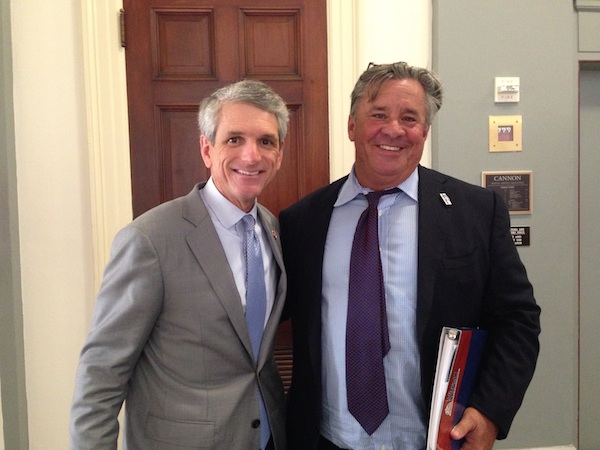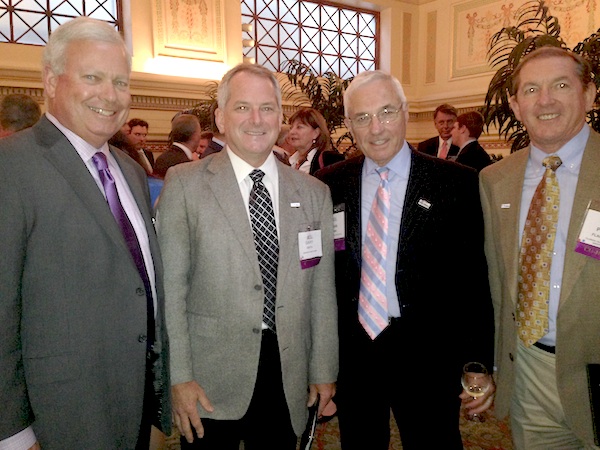USSA sees action in D.C.
The US Superyacht Association attended the American Boating Congress at the beginning of May and pressed for change on four key issues affecting yachting. The results, they say, are encouraging.…
The Bill, the Water Resources Reform and Development Act (WRRDA), passed the House last week and is headed to the U.S. Senate where it is expected to pass. Once enacted, the bill will allocate funds that will ultimately enable renewed dredging in some of the superyacht industry’s most critical areas.
“The next step is to make sure that then the appropriations go to the places that we’re interested in: The Intracoastal Waterway and in Washington State, at sites where we service and build yachts,” John Mann, chairman of the USSA told SuperyachtNews.com exclusively after the passing of the Bill.
The passing of the Bill follows the USSA’s strategic lobbying in Washington D.C. earlier in May during the American Boating Congress. The USSA delegation to Washington D.C. included 13 USSA members, including Mann, Kristina Hebert (who also sits on the Marine Industry Association of South Florida) and Diane Byrne of MegayachtNews.com
In all, the USSA delegation had 25 meetings with Congressmen, US Senators and their senior staff whose constituencies are relevant to the superyacht industry. “There are 535 members of congress, but only 50 to 60 of them that are really interested in our topics because they impact their constituents,” Mann said. “Those are the ones we targeted.”
“I was pleasantly surprised at the reception we received and level of interest in the issues,” Mann said. “It was our seventh trip to Washington D.C. and so the legislators we see each time we’re there now understand who we are and what we’re talking about. They understand the issues that we’re bringing to them.”
Mann and the USSA delegation went to D.C. with four key issues on their agenda to press Congress on; two were legislative (the waterways issue as well as access to federal grants for shipyards), and two were regulatory (extending the duration of US cruising licenses and increasing the tonnage limit to allow more yachts under the US Flag).
“Dredging in Florida and the Pacific Northwest is very important for ensuring safe access to our yards, whether that’s a refit facility like Rybovich or a new build yard like Delta or Christensen in the Northwest”, Mann said. Peter Schrappen, lobbyist for the Northwest Marine Trade Association and the current legislative chair of the USSA led the discussion with Washington legislators to lobby the US Army Corps of Engineers — which has jurisdiction over dredging operations in the United States — to ensure Washington State would be in the running for dredging funding when it’s being appropriated.
Federal grants to shipyards
When the first round of grants were given out to shipyards in the United States under the auspices of the Maritime Administration (MARAD) grants programme three years ago, superyacht yards were shut out. Up until the beginning of 2014, the USSA had been unable to even get a meeting with MARAD. But earlier this year, the USSA’s lobbyist, Duncan Smith, finally secured a meeting. “Our discussion centred around the fact that our member yards not only build leisure vessels, many of them also build commercial and military craft as well,” Mann explained. “Getting them to understand that point is key in the campaign to see some of the government’s MARAD grants made available to these yards.”
Mann explained that through the USSA’s efforts, the Congressman who tabled the initial bill, Duncan Hunter, a Republican representing San Diego, is now a friend of USSA’s. The Marine Group in San Diego, and Trinity in Gulfport Mississippi, are among a number of American yards working on projects for the US military and, if the USSA’s efforts are successful, could be considered for the next round of MARAD grants when they come around. “MARAD now understands our position on this and they have promised us that we are on their radar for the next set of grants,” Mann said. “We will try and help our yards get their grant proposals tabled after the mid-term Congressional elections in November this year.”
The USSA has also been working for about a year with US Customs and Border Protection (CBP) on the issue of extending the duration of US cruising licenses for large recreational vessels. “We met with them while we were in D.C. and the good news is that not only is this issue on their radar, it is in their crosshairs because of their desire to upgrade the Small Vessel Reporting System,” Mann said. The on-line system is a pre-vetting mechanism that enables American and Canadian boaters to transit US marine borders without having to personally report in to customs and border authorities. It is available to all U.S. citizens, nationals and lawful permanent residents as well as Canadian citizens and permanent residents of Canada.
According to Mann, the CBP wants an upgraded reporting system that will allow them to integrate cruising license information—which is currently in an older, separate computer system—with their Small Vessel Reporting data. “One day, if you’re an American or Canadian Captain driving a foreign flagged superyacht, you could be pre-vetted under the Small Vessel Reporting System and not have to clear in as you would a foreign captain coming in,” Mann explained. “That will facilitate at least getting US Captains an easier clearance into US waters.”
Mann says CBP now understands why this is an important issue for the superyacht industry. “They also understand how it will save them time and work—once they get the system set up.” Once the system is established, the USSA will address the same issue for foreign captains on foreign-flagged boats, then work to amend the duration of cruising licenses, which Mann hopes will be increased from one year to two years or four years. “We are encouraged by the progress,” he said.
Increasing the US Flag tonnage limit for yachts
Currently, to register as a recreational vessel under the U.S. flag, a yacht must be below the regulatory tonnage limit of 300 gross tons. It’s a rule that limits the economic impact of superyachts within the U.S. economy. The USSA is seeking to work with the US Coast Guard to increase the threshold to 500gt.
USSA met with Senator Roger Wicker of Mississippi , Congressman Tim Murphy of Pennsylvania and Congressman Hunter of San Diego, who according to Mann, are lending their political support to the USSA’s interactions with the US Coast Guard. “Senator Wicker told us that he wants the tonnage limit increase to happen in his lifetime,” Mann said. “He said he wants more yachts to have the ability to register under the US Flag and not be at a competitive disadvantage with most of the rest of the flags around the world which have a 500gt threshold for the more complex requirements like SOLAS.”
Recently, the American owner of motoryacht Freedom — which is close to 400gt — spent a lot of time and money successfully navigating a course through the US Coast Guard regulations to enable the yacht to be US flagged. “We now have precedent for yachts over 300gt under the US Flag without requiring an act of Congress,” Mann said. “That’s very heartening, and it means that the US Coast Guard now understands the issue from our point of view. From our recent meetings with them, they have told us that they are willing to work on the issue.”
The USSA is currently working on a plan to map out the next steps with the US Coast Guard.
Profile links
U.S. Superyacht Association (USSA)
Marine Industries Association of South Florida
Rybovich Superyacht Marina and Refit
NEW: Sign up for SuperyachtNewsweek!
Get the latest weekly news, in-depth reports, intelligence, and strategic insights, delivered directly from The Superyacht Group's editors and market analysts.
Stay at the forefront of the superyacht industry with SuperyachtNewsweek
Click here to become part of The Superyacht Group community, and join us in our mission to make this industry accessible to all, and prosperous for the long-term. We are offering access to the superyacht industry’s most comprehensive and longstanding archive of business-critical information, as well as a comprehensive, real-time superyacht fleet database, for just £10 per month, because we are One Industry with One Mission. Sign up here.
NEW: Sign up for
SuperyachtNewsweek!
Get the latest weekly news, in-depth reports, intelligence, and strategic insights, delivered directly from The Superyacht Group's editors and market analysts.
Stay at the forefront of the superyacht industry with SuperyachtNewsweek





